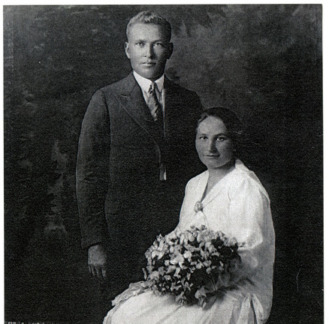Jack and Ida Hakkila

The road from their homeland of Finland to Canterbury, Connecticut, was a long, circuitous one for my father, Jack Hakkila, and my mother, Ida Lillquist. My father was one of nine children, born in 1893 in Ihantala on the Karelian Isthmus. He and five other young men from his village left home in 1917, when young Finnish men were being inducted into the Russian army. With war looming, the situation in Europe was very unstable, but they managed to find passage through Norway and made their way to New York.
My mother was born in Hibbing, Minnesota, in 1903. Her parents had moved from Härmä, Finland in the 1890’s, when Finnish men were being lured for work in the mines. When her father became seriously ill, he chose to move the family back to Härmä when Ida was three years old. He recovered and the family grew to 11 children. A decision needed to be made before my mother’s 22nd birthday on whether she wanted to retain her U.S. citizenship. An uncle in Hibbing offered to sponsor her, the difficult decision was made, and she found work in Hibbing. My mother didn’t have the advantage of so much as a first-grade education, but we assured her that life’s challenges provided her with a solid education.
Jack and Ida met in Two Harbors, Minnesota, where my father had traveled from New York City to enroll in classes at the Workmen’s College for Finnish men. His accordion attracted my mother, and before long she was headed to the Finnish settlement in Brooklyn, New York, where my father worked as a carpenter and managed a boarding house.
My parents married in Brooklyn in 1929. Longing to get out of the city, they followed the suggestion of friends to visit Canterbury, Connecticut, where land was available at a price they could afford. It was rocky and wooded, but to a young couple eager to find a place of their own, it was a dream come true. A small plot was cleared for a rustic cabin and a sauna, and the first family addition arrived in 1930. My father continued his job as a carpenter, driving many hours on poor roads from eastern Connecticut to New York on Monday mornings, returning home on Friday evenings. He spent the weekends clearing land and building.
The rapid growth of the Finnish community in Canterbury pointed to a need for a social hall, and my father always found time to play his accordion for Saturday evening dances. The family continued to grow, a new, larger house was built, and in 1935 the move out of the cramped cabin was made. The last of five children was born in 1948.
Eventually the city job gave way to raising chickens as the family livelihood. In addition to the laying hens, there were cows and pigs, fruit trees, and a large garden. This meant canning and freezing for winter months. All family members shared in the workload. A pond was dug, with another sauna close by, providing a respite for relaxation—swimming and picnicking in the summer and skating in the winter—and an ideal place to entertain guests, young and old.
Although my parents hadn’t had much formal education, they worked hard to make sure that each of their children had that advantage. My parents had many obstacles along life’s path but they worked hard, and along the way helped other recent immigrants get settled. My father served on the Board of the Finnish co-op, and as the Town of Canterbury assessor. Both parents were active with the local Finnish church and activities at the Finnish Hall. Our home was a hub of activity, with a comfortable mix of work and pleasure. There was always room for guests at the dinner table, coffee and pulla were always available, and that’s the way they liked it.
I feel blessed to have grown up in this very Finnish home, with Finnish as our home language. During the war years, our parents followed the news closely, concerned about the hardships their family members were enduring. They were finally able to visit Finland in 1951 and reconnect with loved ones there.
The dream of retirement came in 1969, when they moved to Lake Worth, Florida, to a Finnish community. Family always came first with my parents, and retirement was the time to bask in the accomplishments of children and grandchildren and a life well lived.
Anita Hakkila Smiley